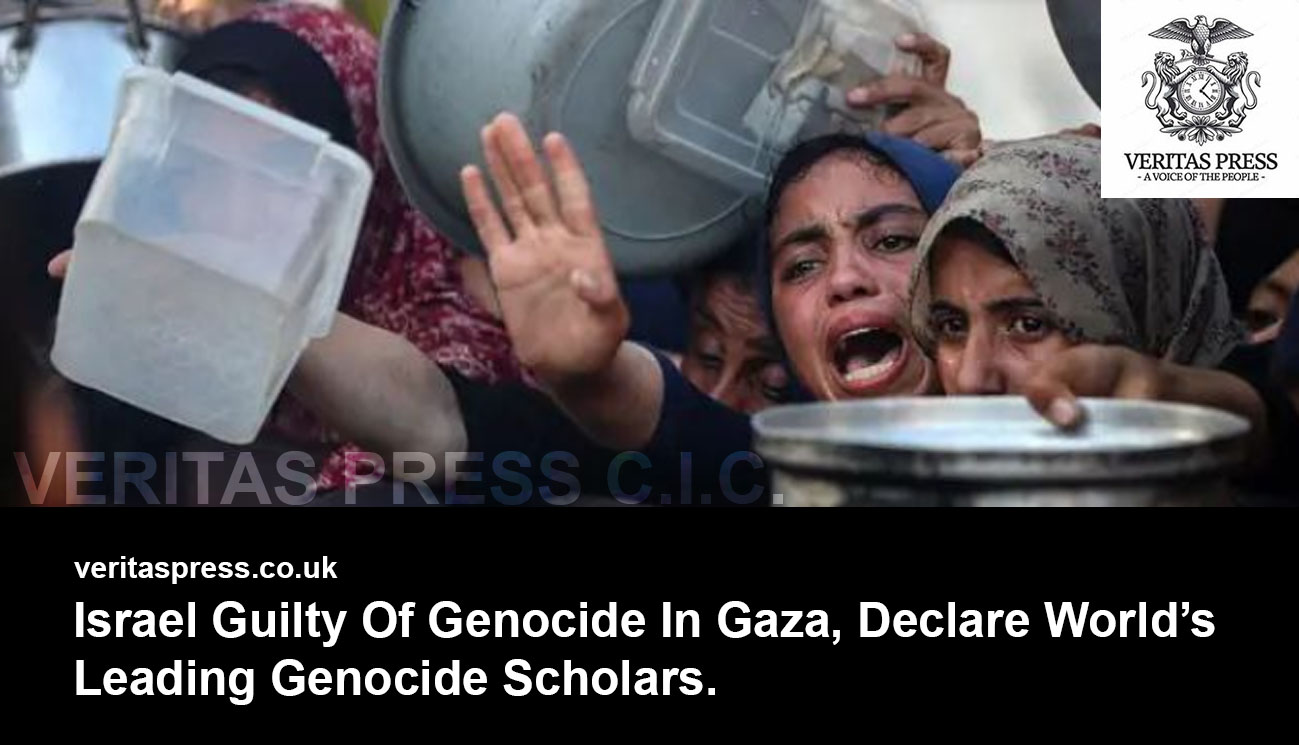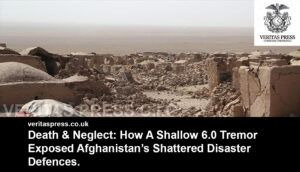Press Release: Veritas Press C.I.C. Author: Kamran Faqir Article Date Published: 01 Sept 2025 at 16:55 GMT Category: Middle East | Palestine-Gaza | US-Israel At War Source(s): Veritas Press C.I.C. | Multi News Agencies
The world’s leading association of genocide scholars has issued an unprecedented resolution declaring that Israel’s war on Gaza meets the legal definition of genocide under international law, intensifying global pressure on Tel Aviv amid mounting evidence of systematic atrocities.
In a landmark move, the International Association of Genocide Scholars (IAGS), a 500-member body founded in 1994, passed a three-page resolution on August 31, affirming that Israel’s “policies and actions in Gaza meet the legal definition of genocide” as set out in Article II of the 1948 United Nations Convention on the Prevention and Punishment of the Crime of Genocide.
The resolution passed with overwhelming support, 86% of members who voted, and declared that Israel’s military campaign constitutes war crimes and crimes against humanity under international humanitarian law and the Rome Statute of the International Criminal Court (ICC).
‘Definitive Statement On Genocide’
“This is a definitive statement from experts in the field of genocide studies that what is going on on the ground in Gaza is genocide,” said Melanie O’Brien, IAGS president and professor of international law at the University of Western Australia, in an interview with Reuters.
The resolution follows nearly two years of relentless Israeli military assault and blockade on Gaza, which has left more than 100,000 Palestinians dead, approx. 377,000 injured, and nearly the entire population displaced at least once. According to the UN and Gaza health authorities, over 50,000 children have been killed or maimed, and 90% of Gaza’s schools have been destroyed or rendered unusable, creating what aid agencies describe as a “generational annihilation.”
Specific Acts Constituting Genocide:
The IAGS resolution outlined key acts by Israel that meet the genocide criteria under the UN Convention:
- Deliberate attacks on civilians, including children
- Starvation and deprivation of humanitarian aid, water, fuel, and other essentials
- Sexual and reproductive violence
- Forced displacement of the population
- Destruction of agricultural fields, bakeries, and food warehouses
- Systematic targeting of medical staff, aid workers, and journalists
It stressed that these actions are intended to inflict conditions of life calculated to bring about the physical destruction of Palestinians in Gaza, in whole or in part.
Targeting Children As Evidence Of Intent:
The resolution highlighted that Israel has killed or injured tens of thousands of children, noting that children are essential to the survival of any group. It referenced previous ICJ interventions, which stated that the targeting of children provides “an indication of the intention to destroy a group as such, at least in part.”
Explicit ‘Intent To Destroy’
The IAGS pointed to statements by Israeli officials and military leaders explicitly calling for the destruction of Gaza. Senior figures have referred to Palestinians as “human animals,” vowed to “flatten Gaza” and turn it into hell, and backed mass expulsion plans to depopulate the Strip permanently.
The resolution also cited reports that Israeli Prime Minister Benjamin Netanyahu endorsed U.S. President Donald Trump’s plan to forcibly remove all Palestinians from Gaza without the right of return, which Navi Pillay, head of the UN Commission of Inquiry, warned amounts to ethnic cleansing.
Historical Precedent: IAGS And Past Genocide Recognitions.
The IAGS has historically played a critical role in shaping global understanding of mass atrocities. Its previous resolutions recognised the genocides in:
- Bosnia and Herzegovina (1990s): IAGS condemned systematic killings and ethnic cleansing in Srebrenica, later affirmed by international courts as genocide.
- Rwanda (1994): The association identified the mass slaughter of Tutsis by Hutu extremists as genocide, contributing to accountability efforts at the ICTR.
- Armenia (1915): IAGS acknowledged the Ottoman Empire’s extermination of Armenians as genocide despite decades of political denial.
- Myanmar (2017): It recognised the military’s campaign against the Rohingya as genocide, a stance echoed in later ICJ proceedings.
By placing Israel’s Gaza campaign in the same category, the IAGS signals that what is occurring is not an ambiguous or politically contested issue among scholars but a consensus within the academic field of genocide studies, aligning Gaza with some of the darkest chapters of modern history.
Growing Legal Consequences: ICC Arrest Warrants.
The declaration adds weight to ongoing legal proceedings at the International Court of Justice (ICJ), where Israel stands accused of genocide in a case brought by South Africa. Separately, the International Criminal Court (ICC) has issued arrest warrants for Netanyahu and former Defense Minister Yoav Gallant, charging them with war crimes and crimes against humanity, including:
- Starvation of civilians as a method of warfare
- Intentionally directing attacks against a civilian population
- Murder and persecution
Famine Confirmed, Infrastructure Obliterated:
A UN-backed global hunger monitor has confirmed that famine has taken hold in parts of Gaza, driven by Israel’s deliberate blockade and destruction of infrastructure. Entire neighbourhoods lie in ruins, 90% of schools have been bombed, and hospitals have been repeatedly targeted, leaving millions without medical care.
Global Academic And Civil Society Consensus:
The IAGS joins a growing chorus of international voices, including Amnesty International, Human Rights Watch, B’Tselem, DAWN, Forensic Architecture, and UN Special Rapporteurs, who have concluded that Israel is committing genocide in Gaza.
“This legal assessment has become mainstream within academia, particularly in the field of genocide studies,” said Sergey Vasiliev, professor of international law at the Open University of the Netherlands.
Response From Gaza Authorities:
Gaza’s Government Media Office welcomed the resolution, calling it a “prestigious scientific stance” that reinforces evidence before international courts.
“It places a legal and moral obligation on the international community to act urgently to stop the crime, protect civilians, and hold the occupation leaders accountable before the International Criminal Court,” the office said in a statement.
Call To Action For UN And States:
The IAGS urged UN member states and ICC signatories to:
- Comply with their obligations to prevent and punish genocide
- Cooperate with the ICC in arresting and surrendering individuals under warrant
- End arms transfers to Israel under the Arms Trade Treaty
- Support a process of repair and transitional justice to ensure democracy, freedom, and security for Gaza’s people
The resolution underscores that putative security measures, Israel’s justification for its campaign, are often a pretext for mass killing and genocide.
What’s Next?
The resolution is expected to intensify calls for sanctions and diplomatic isolation of Israel, as well as pressure on Western states to halt military aid. Legal experts warn that failure to act could expose states to complicity under the Genocide Convention.
As Israel faces mounting international condemnation and legal jeopardy, the question now looms: Will world powers uphold their obligations under international law or allow impunity to prevail?
In Conclusion: The Stakes, A Historic Test for International Law.
The IAGS resolution does more than condemn Israel; it throws down a gauntlet before the international community. It confirms what countless human rights organisations, UN experts, and legal scholars have been warning for nearly two years: Gaza is not a battlefield; it is a killing field created by design.
What makes this moment historically consequential is not just the magnitude of Israel’s crimes, but the paralysis, or complicity, of the very powers sworn to prevent genocide. The 1948 Genocide Convention was born from the ashes of the Holocaust with a promise of “never again.” Today, that promise lies in ruins as governments that drafted the law supply weapons to a state accused of its gravest violation.
Legal experts warn that states’ continuing military support to Israel is not merely failing to act; they risk becoming accessories to genocide under international law. The ICC arrest warrants for Netanyahu and Gallant mark a watershed, but without enforcement, they remain symbolic. Justice delayed here is not just justice denied; it is justice buried beneath the rubble of Gaza, alongside tens of thousands of civilians.
The IAGS resolution is unambiguous: this is genocide, deliberate and systematic. Israel’s leaders have signalled intent in their own words, “flatten Gaza,” “no civilians there,” “human animals”, and acted on it with policies of starvation, mass displacement, and targeted annihilation of a besieged population. When scholars of genocide speak with near unanimity, history demands the world listen.
The question is no longer whether the evidence meets the threshold. It does. The question now is whether international law has any meaning beyond paper and rhetoric, or whether, once again, the crime of crimes will go unpunished because its perpetrators are shielded by power.
If the world fails Gaza now, it is not only Palestinians who will pay the price. It is the death of the Genocide Convention itself, and with it, the death of the very idea that humanity can learn from its darkest chapters.




























Leave a Reply